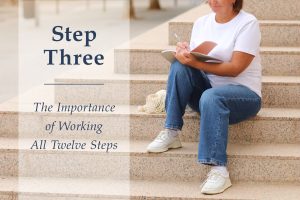When the negative memories started to fade, the positive ones had more room to show themselves.
Fear, anger, resentment—I was looking for a connection among these three emotions because they kept nudging against my serenity. I looked up the definitions and was surprised at how they all flowed together:
Anger is in the present. I am not getting my way now.
Resentment is the past. I did not get my way then.
Fear is in the future. I will not get my way when.
I will be the first to admit that I have been a control freak—sort of self-will run riot. (Possibly, I still am.) I had expectations of the world, and they were often not met. I know now that just because I wanted something to go one way or my way doesn’t mean that it would have or should have. My willfulness did set me up, though, for self-justification and self-righteous anger. The world was out of my control, and I was mad about it.
I turned to eating because it gave me a sense of control. I could “control” the food, but I could not control the result. My weight went up to over 200 pounds (91 kg) and I became diabetic. That’s when I came to OA. I cut sugar out of my life, became abstinent, and lost 70 pounds (32 kg). The weight loss resolved my diabetes, but it did not resolve my self-righteous anger, fear, and resentments. They continued.
This is how I realized that I had to let go of my expectations and come to understand that the world was not all about me. When I stopped demanding things go my way, I could open myself up to truly see the situation around me and my role in it. When I could accept there were other ways that people could act and situations could go, I stopped being angry.
I’ve heard that resentments are wishes for a different past. Perhaps my wish was for a past in which I had gotten my way. It took me a long time to realize that people in my life had acted the best way they could and, no, not always to my advantage. Those situations were more complicated than I could have understood when I was younger.
Before I came to OA, I had an easier time remembering my hurts and resentments than the positive things that had happened. As I worked the Twelve Steps, I learned to let go of thoughts about how someone should have acted or how things should have gone. When the negative memories started to fade, the positive ones had more room to show themselves.
At the same time, fear for the future was rearing its head. Even in recovery, I obviously still don’t know what will happen in the future. It has not been revealed to me. But this I do know: if I maintain my attitude of letting go of expectations and my practice of asking for insight and guidance, then I will be able to handle what is given to me.
Today, I have four years of abstinence and the promises of the Big Book (Alcoholics Anonymous, 4th edition, pp. 83–84) have come true for me. I have learned that I am able to understand with greater clarity what it means to say, “We will intuitively know how to handle situations which used to baffle us” (p. 84). I have gained serenity, and that has been one of the greatest gifts of the OA program.
—Beth, Georgia USA





